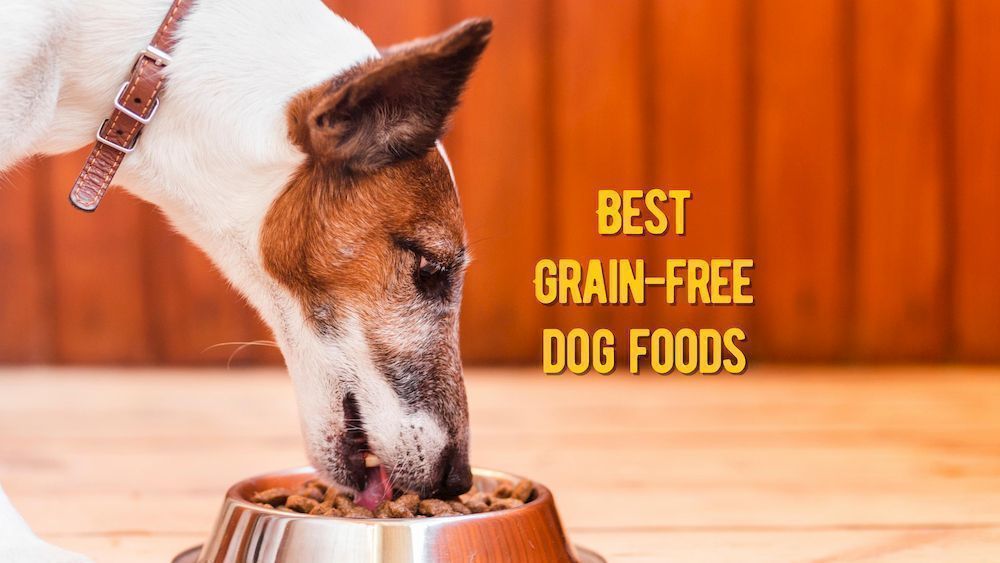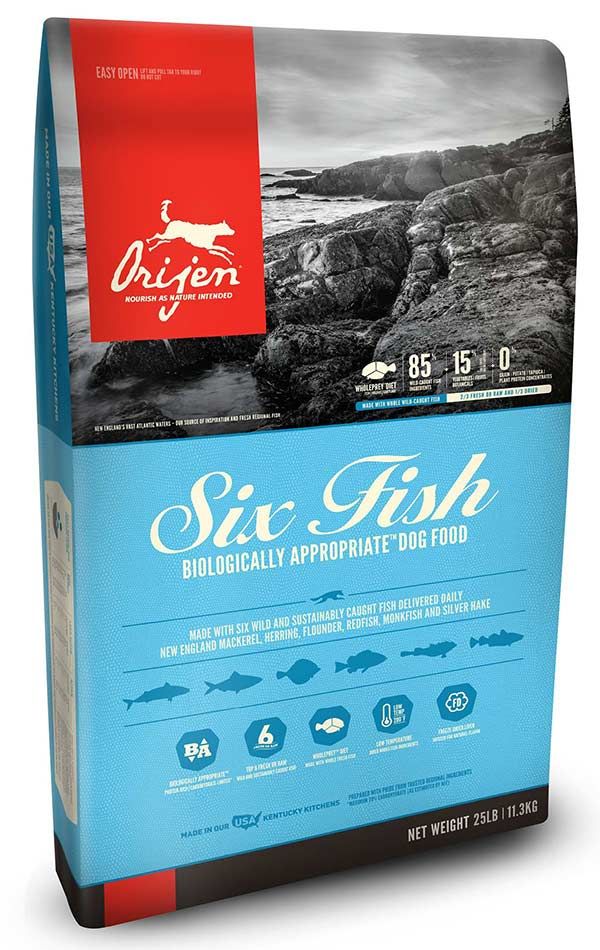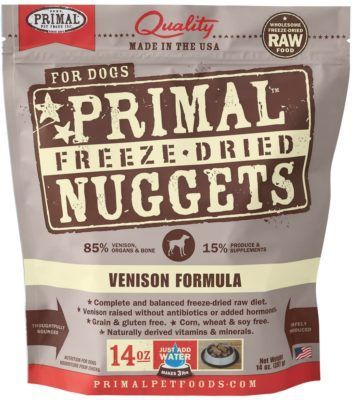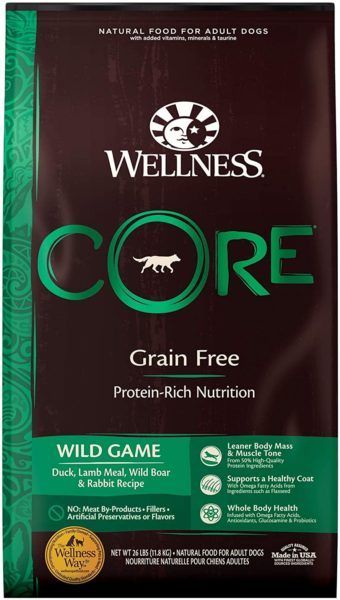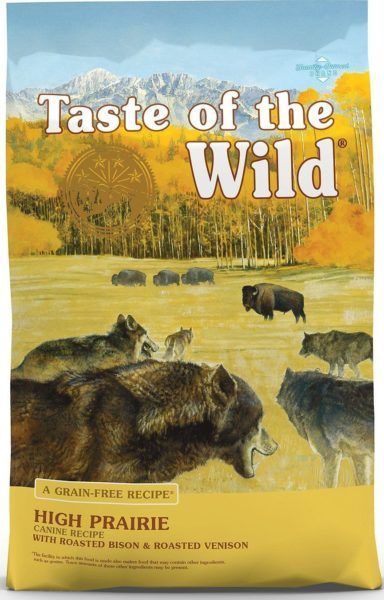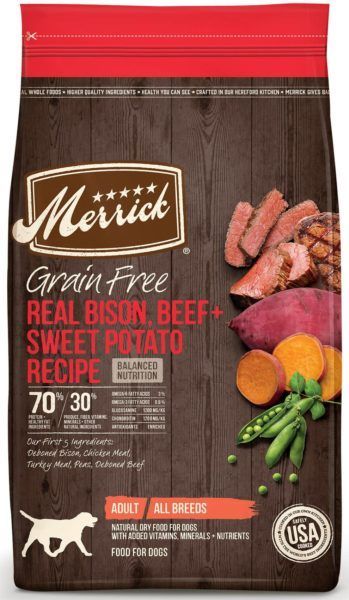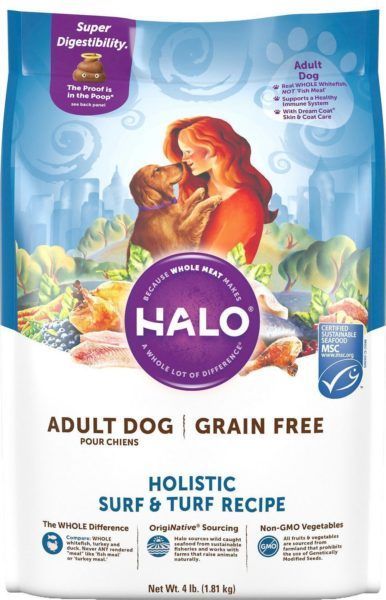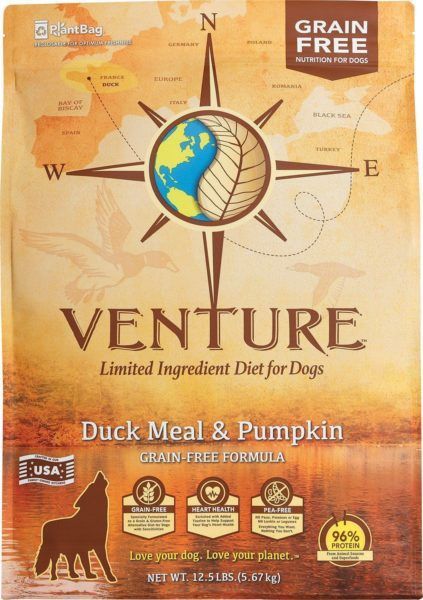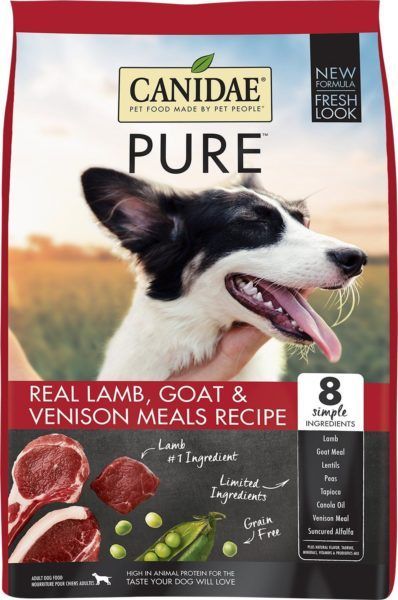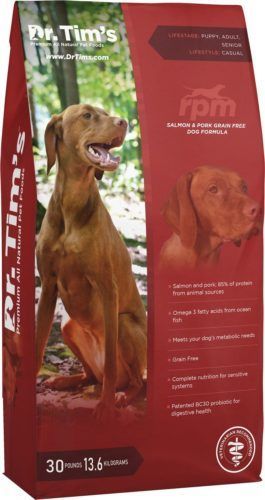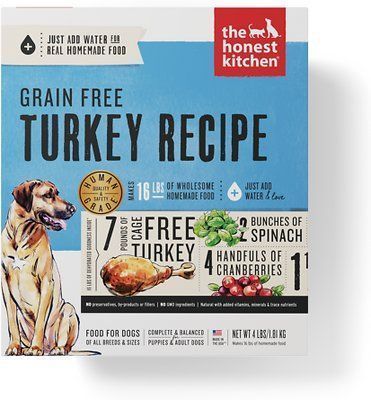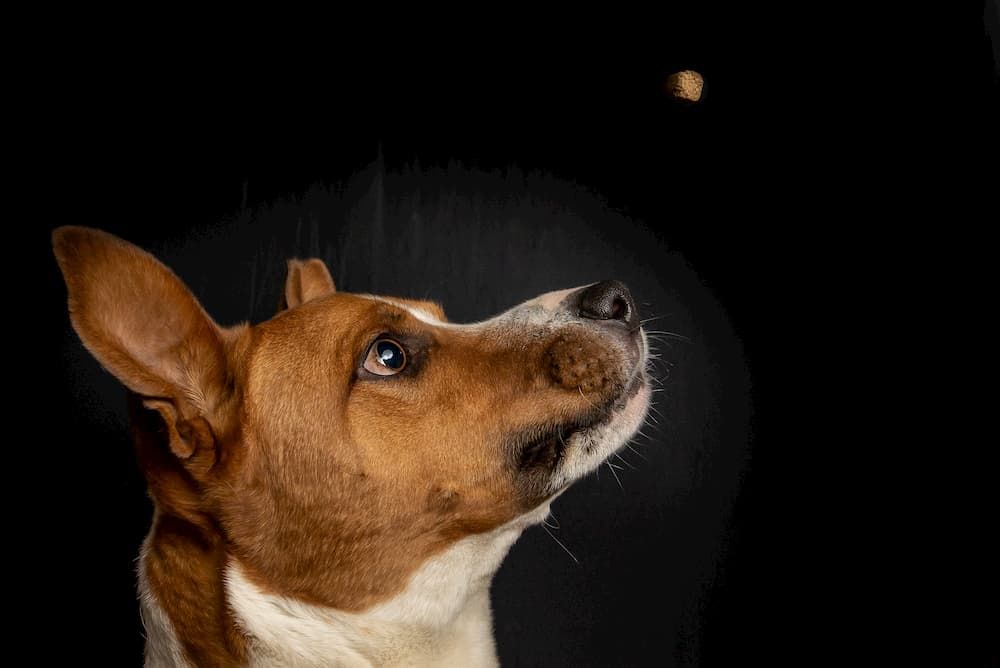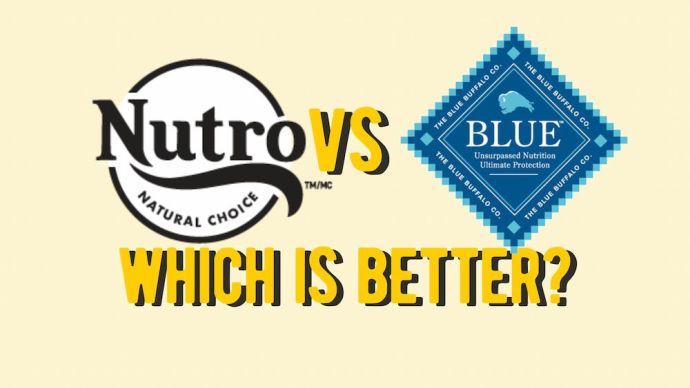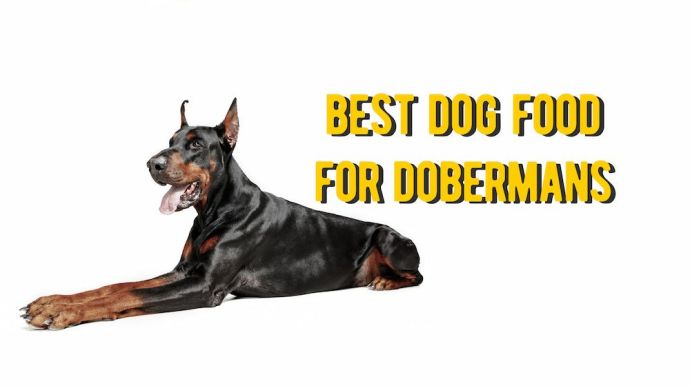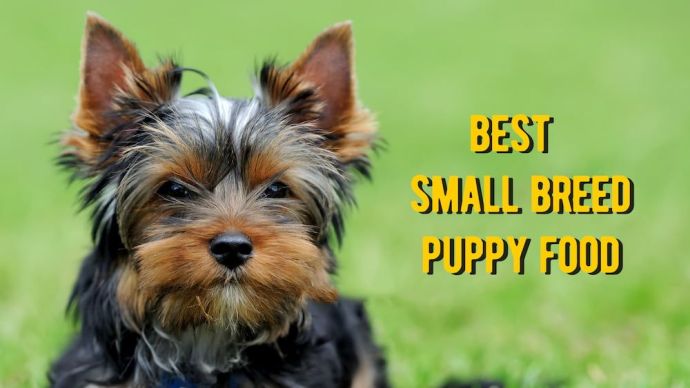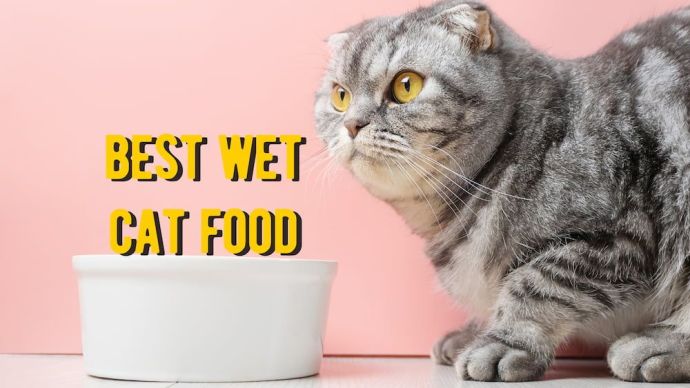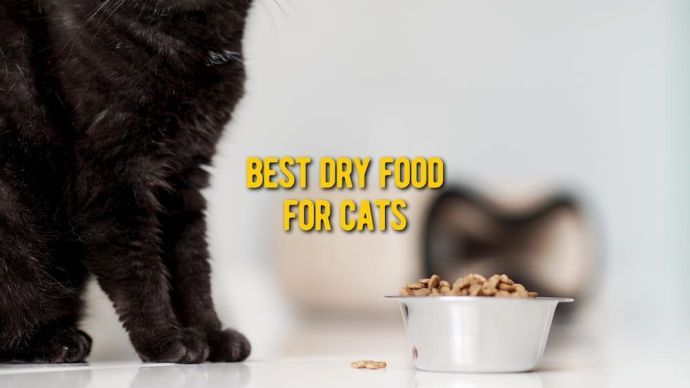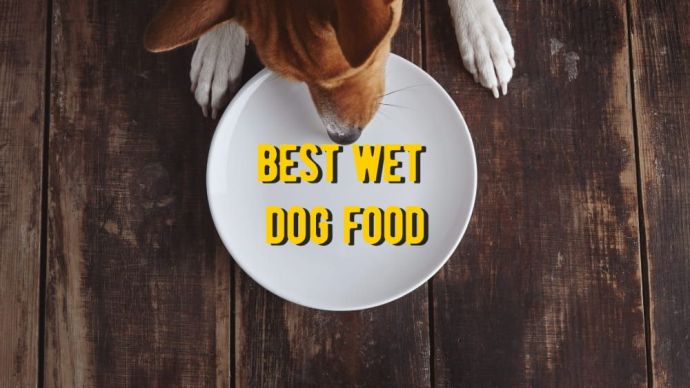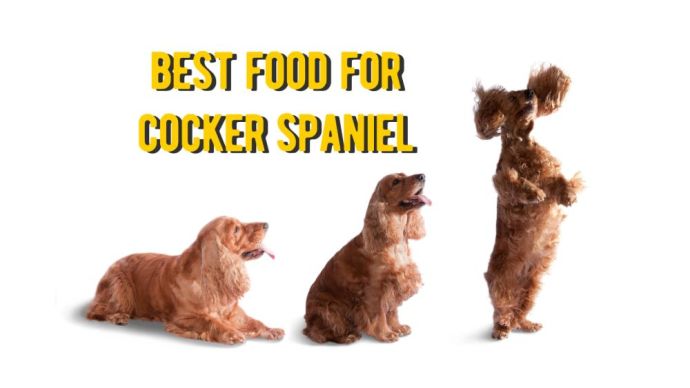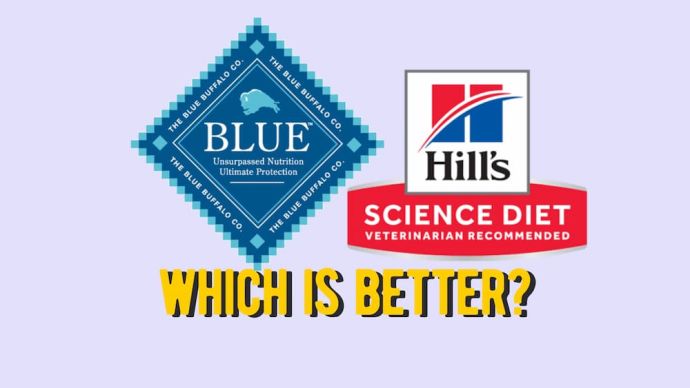The Best Grain-Free Dog Food (Vet Review)
Written by:
Author: Dr. Joanna De Klerk
Dr. Joanna de Klerk is a professional Clinical Veterinarian. Member of the Royal College of Veterinary Surgeons UK and a member of the South African Veterinary Association. Graduated with a Master of Science in Tropical Animal Medicine in 2018. Professional author, she has been writing in scientific journals, and also several book series. Joanna loves to enjoy time with her young daughter and family in her free time.
View all 10 articlesLearn about our editorial process and veterinary review board.
Viewed: 552
Updated on: 02/14/2022
Foods which are ‘free-from’ have become increasingly popular in the supermarket. You’ve probably noticed as you browse through the aisles, that many foods are ‘dairy-free, ‘gluten-free’ or ‘soy-free’, and consumers lap them up on the assumption that ‘free-from’ foods are healthier or more natural.
Over the past decade, consumer interest in pet nutrition has been on the rise. And it’s no surprise, as after all, pets are part of the family, so why shouldn’t they also have the most healthy, natural foods? The ‘free-from’ craze has also toppled over into the market, and many owners are now seeking boutique, exotic-ingredient and grain-free (BEG) diets.
In 2017, according to the U.S. Bureau of Labor and Statistics, $31.1 billion was spent on the development and manufacturing of pet food. This huge sum of money has been exponentially increasing year-on-year, and the demands for grain-free and BEG diets have been a large influence.
TOP-10 Dog Food without Grain Reviews
Below you will find the 10 the best grain free foods.
1. Orijen (Six Fish) Grain-Free Dog Food
ORIJEN food is rich in protein and does not contain grains. The feed contains the following ingredients: chicken and turkey meat, eggs, and other healthy products. The food does not contain preservatives. With 38% richly nourishing protein, and 20% carbohydrates to nourish dogs of all life stages according to their evolutionary and biological needs.
Key benefits:
- Quality protein-fortified ingredients to ensure balanced nutrition and higher energy.
- Fortify with lutein to ensure good vision health.
- Made with grain-free natural and animal components to support dog overall immune system.
- Contains lutein and freeze-dried cod liver
Pros
Cons
- Free of rendered poultry meals.
- 1/3 of the meats are from dehydrated chicken and turkey.
- With 38% richly nourishing protein.
- Relatively expensive.
2. Primal Freeze-Dried Dog Food Nuggets (Venison)
This food contains the following ingredients: venison, venison hearts, venison liver, crushed venison bones, cabbage, organic vegetables, organic herbs, as well as vitamin E, and other useful ingredients. Finely ground venison bones provide a sufficient level of calcium in the diet. Vitamin E acts as an antioxidant. The percentage of protein in the feed is 59%.
Key benefits:
- It contains organic nutritional supplements to give your dog a well-deserved meal.
- Fresh venison livers, hearts, and ground bones to help provide good nutrients, strong bone, and easy digestion and circulation process.
- Made in the USA.
- Features zero grain and corn.
Pros
Cons
- Each recipe features a single source of human-grade animal protein such as chicken, duck, turkey, and lamb.
- Primal Pet Products sources their proteins from local farms and ranches to ensure that they are all antibiotic-, steroid-, and hormone-free.
- Picky or finicky eaters may not like the texture of freeze-dried dog food at first.
3. Wellness Core Natural Grain-Free (Duck)
Wellness CORE Grain-Free Wild Formula Dry Dog food will provide your dog with a proper diet and well-being. The feed does not contain grain fillers. This product includes ingredients from protein-rich duck, boar, and rabbit, as well as healthy vegetables such as cabbage, spinach, and broccoli. Wellness CORE Wild Game Formula has 54% protein. The protein formula is also free of potatoes, gluten, and grain additives!
Key benefits:
- Contains 100% grain-free dog food
- It contains high protein and healthy veggies concentrates to give your dog balanced nutrition every day.
- Fortify with antioxidant properties, vitamins A and C to foster functional gastrointestinal operations
- Made in the USA
Pros
Cons
- The food contains antioxidants, omega fatty acids and glucosamine.
- Probiotics, which are contained in the feed, improve digestion.
- Made in the USA.
- Some issues with diarrhea.
4. Taste of the wild (High Prairie) Dry Dog Food
This food is a balanced diet for your pet. The feed contains natural proteins, peas, and sweet potatoes. The feed formula does not involve grains. Ingredients from real fruits and vegetables act as antioxidants.
Key benefits:
- It contains zero-grains. Real buffalo is used to enhance the muscles of the dog.
- It contains strong antioxidants, real veggies, and fruits, essential minerals and vitamins to ensure healthy skin and brighter coat.
- Formulated with other protein-concentrated ingredients to ensure immense nutritional benefits.
- No fillers, corn, wheat, or grain.
Pros
Cons
- Grain-free recipe.
- The food contains natural protein to support strong muscles.
- Natural recipe with added vitamins and antioxidants.
- Made in the USA.
- The manufacturer has a recall and lawsuit history.
5. Merrick Grain-Free (Bison Beef and Sweet Potato) Recipe Grain-Free Dry Dog Food
Provide your pet with a balanced meal. The formula of this feed was developed in the USA. It contains no grain ingredients (corn, wheat, soy, gluten, or artificial preservatives). The food is also enriched with vitamins.
Key benefits:
- It contains deboned bison that improves dog energy levels, strong bones, and joints of the dog.
- Features omega-3 and omega-6 fatty acids that ensure healthy skin and brighter coat.
- It contains essential nutrients and vitamins needed for puppies’ healthy living.
- Zero preservatives, corn, gluten, soy, or fillers.
Pros
Cons
- Contains omega-3 and omega-6 fatty acids to improve skin health and shiny coat.
- 100% free of preservatives.
- Does not contain corn, wheat, soy or gluten.
- Some customer reviews indicate dogs have been sick or had loose stools after switching to this food, but this is a minority.
6. Halo Holistic Grain Free (Surf and Turf)
The Halo formula uses natural meat, poultry, or fish. This product is produced from non-GMO plant sources. It contains vitamin E, which supports a healthy skin tone and shiny coat.
Key benefits:
- It contains omega-3 fatty acids which helps dogs to maintain a smooth coat and healthy skin.
- Made with whole meat for essential nutrient and easy gastrointestinal activities.
- Features grain-free ingredients from non-GMO natural sources to give your dog super nutritional worth.
- 100% natural grain-free with no artificial preservatives, additives, or flavor.
Pros
Cons
- The feed contains natural meat.
- Non-GMO.
- It contains vitamin E.
- Quite expensive.
7. Earthborn Holistic Venture (Duck Meal and Pumpkin)
The company Earthborn Holistic is engaged in creating specific diets for dogs. Feeds are created from high-quality ingredients. Earthborn Holistic Venture is made from duck meat. This recipe contains methionine for a healthy heart. This food is made without the use of grains, gluten, and peas, lentils, legumes, potatoes, eggs or chicken, dyes, fillers, by-products, artificial preservatives, or GMO ingredients.
Key benefits:
- Made with specially crafted vine-ripened pumpkins to help fortify the meal with essential nutrients with healthy digestion.
- It contains 100% grain and preservatives-free ingredients to give pet a perfect meal.
- Protein is 96% derived from animal sources and it contains top-quality fiber to give dog essential nutrients and easy digestion.
Pros
Cons
- Contains high-quality ingredients.
- Contains duck meat.
- Made without the use of grains, gluten, legumes and GMOs.
- Price quite expensive.
8. Canidae Grain-free Pure (Real Lamb)
CANIDAE PURE Real Lamb is a premium dry dog food that does not contain grains. This recipe consists of eight natural ingredients, without corn, soy, wheat or preservatives. To prepare the feed, lamb meat is used as the first ingredient. The grain-free formula and fresh meat help your pet avoid allergies.
Key benefits:
- It contains up to eight ingredients to ensure a balanced diet
- Contains grain-free, flavor-free, and preservative-free ingredients which makes a perfect meal for dogs with sensitive digestion.
- It contains substances like antioxidants, probiotics as well as omega-3 and -6 acids to improve the immune system and overall wellbeing of your dog.
Pros
Cons
- Premium dry dog food.
- Does not contain corn, soy, or wheat.
- Contains the meat of the lamb.
- Relatively expensive.
9. Dr. Tim’s Rpm Grain-Free (Salmon & Pork)
The salmon and pork formula is designed with the perfect blend of carbohydrates, fat, and fiber to support health. The feed does not contain grains. It contains probiotics, prebiotics, and natural antioxidants.
Key benefits:
- Perfect for picky eaters.
- Method of cooking is usually slow and this improves the quality of the ingredients as well as the rate of digestion.
- The composition of the high antioxidant derived from artificial-free salmon helps to improve the mental ability and overall health condition.
- Omega-3 fatty acids help your dog derive a healthy skin and shiny coat.
Pros
Cons
- The feed is made without adding wheat or soy grains.
- Completely natural recipe.
- Supports your dog’s digestive and immune health.
- Some owners have reported receiving counterfeit bags that are not legitimate, so be sure to check the bag carefully and potentially consider buying from an alternative retailer.
10. The Honest Kitchen Dehydrated Grain-Free (Turkey)
Honest Kitchen Embark dog food is created for active dogs. This product is made from healthy foods such as Turkey. The composition of the feed is rich in antioxidants. This product does not contain undesirable ingredients such as corn, soy, rice, beet pulp, or wheat.
Key benefits:
- Made with 100% grain-free quality ingredients for better digestion and nutrients.
- It contains natural ingredients with no by-products, preservatives, additives or GMO ingredients to give your dog the expected taste of food.
- It is fortified with a high concentrate of calories than carbs suitable for your active and adult dogs regardless of the size.
- Packed with 80% protein recipe.
- This top-quality product satisfactorily meets the FDA’s safety standards and it’s labeled “Human Grade”.
Pros
Cons
- It does not contain undesirable ingredients for pet food, such as corn, soy, rice or wheat.
- Suitable for puppies.
- Balanced for dogs of all ages and breeds.
- Their products are pricier than most other brands.
*Ratings are formed by the author of the article based on own research and combined with customer reviews.
Buying Guide
The truth is, the idea that grain-free dog food is better for your pup has been rooted in a non-scientifically backed myth. It’s a common misconception that grains are linked to allergies or gluten intolerance, or are filler ingredients and linked to high carbohydrate contents. Yes, many grain-free diets are excellently constructed, and some dogs do much better on a grain-free diet, but if your pet isn’t one of them, grains can be very healthy for him.
So, what are the Most Common Grains found in Dog Food?
- Wheat
- Barley
- Corn
- Oats and oatmeal
- White rice
- Brown rice
- Rye
- Sorghum
Grains are an excellent source of fiber, protein, vitamin E and omega oils. They are particularly healthy if they are whole grains, which are more natural than refined grains.
Some grain-free dog food brands have, in fact, been associated with health implications. Heart disease is more commonly observed among dogs fed a BEG or grain-free diet due to’ dilated cardiomyopathy’ or’ DCM’. DCM is a heart condition where the walls of the heart become thin and flaccid, resulting in less ability to deliver effective pumps of the blood around the body. Eventually, the blood pressure inside the heart causes the weak walls to dilate and increase the heart’s size.
The exact link between DCM and grain-free diets is still not fully understood, however, it is believed to be linked to a taurine deficiency in dogs who eat these diets. There have been suggestions that the deficiency could be from a primary dietary deficiency in taurine, reduced bioavailability, increased losses of taurine in the feces, or a change in the metabolism in the body of taurine.
The FDA (U.S. Food and Drug Administration) has been passively recording data on the topic, and due to recent awareness, many grain-free diets are now adding taurine to their ingredients list, to avoid the development of DCM.
However, not all grain-free dog foods are bad. In fact, many are excellently compiled. Also, a small minority do benefit from a grain-free diet, as each dog has its own unique nutritional needs. So, if your pet is particularly sensitive to grains, finding the right grain-free dog food is important. You should look for high-quality food which is fully nutritionally balanced. Your vet can be a great resource for information on which brands might suit your dog.
Advantages of No Grain Food for Dogs
While the advantages of grain-free diet are not rooted in science, their popularity indicates some advantages to feeding certain individual dogs on grain-free formulations.
These include:
1. Not all Grains are healthier than vegetables
Whole grains are wonderful, healthy ingredients that are full of nutrients such as fiber, vitamins, protein, and omega oils. They can help regulate digestion and boost health. However, not all grains are healthier than vegetables. Many cheaper companies will use refined grains. Whole grains contain the endosperm, germ, and bran, whereas refined grains only contain the endosperm. This reduces their nutritional value considerably. Refined grains are considered ‘filler’ ingredients, creating bulk and adding fewer valuable nutrients than their weight is worth. In these cases, healthy vegetables and fruit are much better alternatives.
2. Some dogs have intolerances to Grains
Grain allergies and intolerances are uncommon. Food allergies account for <1% skin allergies, and <10% of general allergies. Among them, most food allergies are to animal proteins and not grain. However, it is important to note that even though they are rare, they are not impossible. Some dogs truly are intolerant and have reactions to foods containing grains.
3. Grains can increase Flatulence
In comparison to other ingredients, grains can ferment more than other ingredients during the digestion process, leading to excess gas being produced. This is low down in the intestinal tract. Therefore, it doesn’t cause gastric bloating, but for some dogs, it can cause flatulence. Low-quality, refined grains are more likely to cause this issue, rather than whole grains. It should be noted that other ingredients such as lactose, potatoes, and table scraps are also common causes of flatulence. Also, an imbalance in the gut microbiome (friendly, commensal bacteria) also increases methane production. The good news is, many grain-free diets have additional probiotics to aid digestion.
What to look for in Dog Food without Grains
When searching for new food, whether it is normal or grain-free, there are many things to consider. It is not as simple as picking one off the shelf based on how appealing the packaging is. Doing your research, and even contacting the manufacturer directly is really important. Therefore, it takes more time than just making a decision in the pet store. The following questions should be considered:
Does the manufacturer employ a qualified nutritionist?
- An animal nutritionist should either have a Ph.D. in animal nutrition, or be board-certified by the American College of Veterinary Nutrition, or the European College of Veterinary Comparative Nutrition.
Does the Diet formulation meet AAFCO nutrient profiles?
- These are guidelines set out by the AAFCO (Association of American Feed Control Officials), which detail how much of every nutrient and mineral the food should contain based on the life-stage of your dog (for example, puppy or adult). Some packaging will show an ‘adequacy statement’ stating that it meets AAFCO standards, others you will need to phone the manufacturer to confirm.
Where is the Food manufactured?
- Sometimes the packaging will state ‘produced in the USA’. Home country products are the best, as you can be assured that the ingredients are of a higher quality and that there is less of a carbon footprint on the manufacturing of the food.
Are the Ingredients of high quality?
- The ingredients list is in order of weight, and therefore the first ingredient has the highest quantity. Meat proteins should be first on the list, followed by high-quality carbohydrates, such as pumpkin. Some grain-free diets substitute grain with highly refined starches such as potato and cassava, which do not add nutritional value, so this should be considered when looking at grain-free diets.
Does the recipe have added taurine?
- The addition of taurine may lower the risk of grain-free diet-associated DCM, although specific levels needed to prevent DCM have not been scientifically established.
Does the food suit the life-stage of your dog?
- Different foods are formulated for different life-stages. A young, growing dog should be on puppy food, as this has higher levels of protein and calcium to aid growing muscles and bones. A senior dog should be on a senior food, as this has higher levels of omega oils for aching joints as well as a lower calorie content to address a more sedentary lifestyle.
What do the consumer reviews say?
- Looking at consumer reviews will give you a good understanding of how the food is at ground level. Reading how the food affected dogs first-hand, for better or for worse, is a valuable insight into the product.
READ MORE: How often should you Feed a Puppy
It can be confusing and frustrating to choose a new dog food, so if there is something you want to know, contact the company directly. If they truly want to improve your dog’s health, they will answer you with what you want to know. Your veterinarian is also a valuable source of knowledge and can aid you in your decision.
FAQ – Veterinary Recommendations
👩⚕️ Is Grain-Free Food better for dogs?
There is no scientific evidence that grain-free food is better for dogs than a high-quality grain inclusive diet. Common myths related to this type of food are that grains are a common cause of allergies, grain-free pet foods are lower in carbohydrates, grains cause gluten intolerance and that grains are filler ingredients. These are all incorrect, and grains, especially whole grains, are incredibly beneficial to your dog’s health. For a tiny proportion, grain-free dog food will suit them better due to mild gut or skin sensitivities, however, this is the exception and not the rule.
🐶 Do dogs need these diets?
Dogs do not need grain-free diets to be healthy. Grains, especially whole grains, are excellent sources of fiber, minerals, protein, omega oils and vitamin E (an antioxidant that improves the immune system). Grain-free diets may suit dogs with skin or gastrointestinal sensitivities, however, for many of these dogs, a grain-free diet will not make any difference.
🐾 Are there any problems with grain-free diets?
Grain-free diets do carry health risks. The main risk associated with them is the development of dilated cardiomyopathy (DCM). The exact link between the diet and condition is still unknown, however, it is suspected that taurine levels play a role. Dilated cardiomyopathy is a serious condition, which can lead to heart failure, and therefore buying a grain-free diet with a suitable taurine level is essential. Also, grain-free diets are sometimes associated with high-fat content. This is because some try to have a low carbohydrate content, and therefore the calories must come from a different nutritional source. High-fat content is not suitable for all dogs, especially dogs who are overweight or have suffered from pancreatitis in the past.
🐕 Is it true that dogs are allergic to grains?
Food allergies are uncommon in dogs. Less than 1% of skin allergies are related to food, and less than 10% of all other types of allergies, such as gastrointestinal-related allergies, are from food. Of these allergies, animal proteins such as chicken, beef and dairy products are the most common causes. However, grain allergies and sensitivities do exist, but they are infrequent in dogs.
🐾 Are grains and gluten intolerance linked?
Gluten intolerance (also known as celiac disease) in humans is a hereditary autoimmune condition, linked to hypersensitivity to wheat (and sometimes barley and rye) gluten proteins. In dogs, it is extremely rare, and there has only been one report of it from a single inbred Irish Setter family. Therefore, even though grains will cause problems for those afflicted with gluten intolerance, it is not something that should cause pets.
🦴 Are grain-free diets carbohydrate-free?
By removing grains from a diet, a carbohydrate source is removed. However, most grain-free diets contain other carbohydrate sources such as pumpkin, sweet potatoes and potatoes. Some of these have an even higher carbohydrate content than grains themselves, and therefore grain-free diets are not carbohydrate-free. But that isn’t a bad thing, as carbohydrates are an essential energy source and a necessary nutrient required for life. Some grain-free diets specifically aim to be low in carbohydrates and substitute grains for peas, lentils or beans. These are healthy ingredients, but for some dogs, these will cause more of a gastrointestinal upset than grains would have. These diets which are low in carbohydrates also have a higher fat content, which is not suitable for overweight dogs or dogs who are prone to developing pancreatitis.
🐶 Which are good and which are bad grains?
Whole grains are grains that contain the endosperm, germ, and bran, whereas refined grains only contain the endosperm. Therefore, whole grains are more nutritional for your pet. This does not mean that processed grains are bad for your dog, but they do not provide as many nutrients as whole grains. Grain can be either a whole grain or refined grain, and therefore it is important to check the packaging to determine how much it has been processed. A typical example of a refined grain is white rice, and its wholegrain version is brown rice.
Take-Home Message
Grain-free diets are very popular, but the reasons commonly cited for their popularity are not based in science. Nevertheless, there are some excellent grain-free diets on the market, and if you do your research well and are cautious of the health implications associated with some grain-free diets, you will find many products that will greatly benefit your dog’s health and wellbeing.
 Dog Food Reviews The 15 Best Dog Food for Skin Allergies (Vet Approved Review)
Dog Food Reviews The 15 Best Dog Food for Skin Allergies (Vet Approved Review) - 1253
- 0
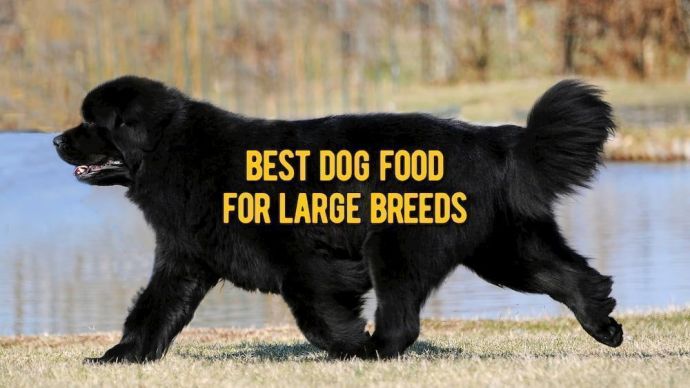 Dog Food Reviews The Best Dog Food For Large Breed, According to Veterinarian
Dog Food Reviews The Best Dog Food For Large Breed, According to Veterinarian - 404
- 0
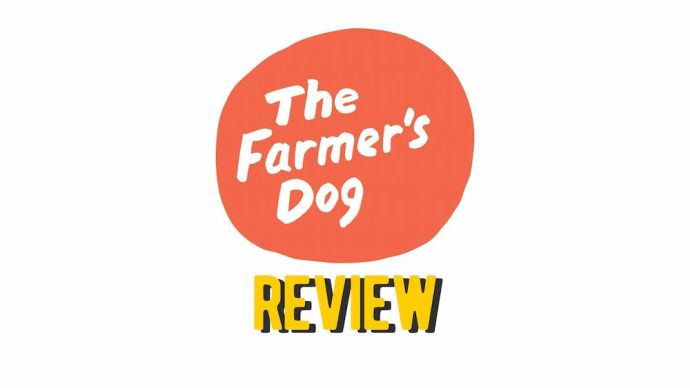 Dog Food Reviews The Farmer’s Dog Review: Complete Farmer’s Dog Food Review (Vet Approved)
Dog Food Reviews The Farmer’s Dog Review: Complete Farmer’s Dog Food Review (Vet Approved) - 558
- 0
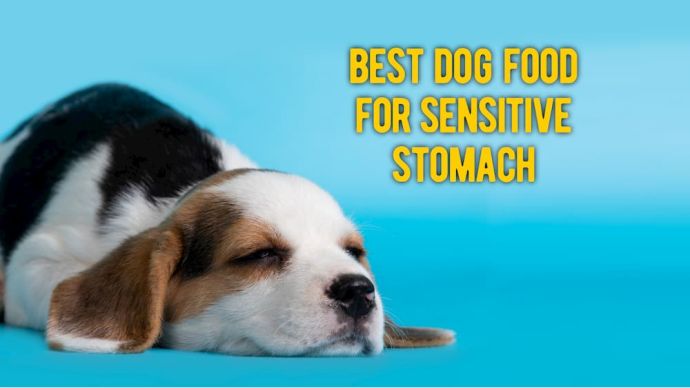 Dog Food Reviews The 10 Best Dog Food For a Sensitive Stomach (Vet Approved Review)
Dog Food Reviews The 10 Best Dog Food For a Sensitive Stomach (Vet Approved Review) - 771
- 0
 Dog Products & Toys Reviews The 10 Best Brush for Australian Shepherd: Review and Buying Guide
Dog Products & Toys Reviews The 10 Best Brush for Australian Shepherd: Review and Buying Guide - 13353
- 0









